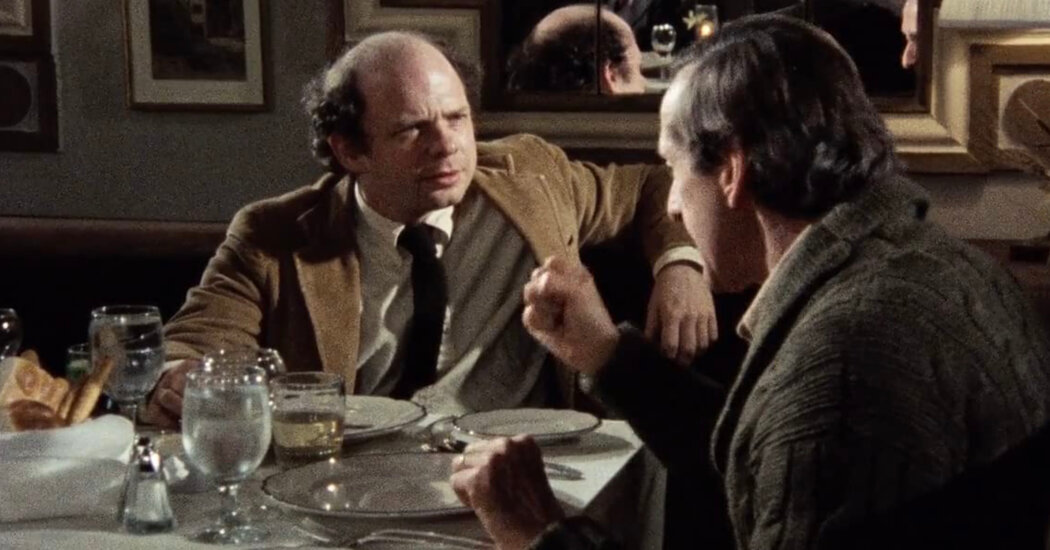
Hear me out: “My Dinner With André” was the original podcast. Released on Oct. 11, 1981, this seminal art-house flick invited us to eavesdrop on 110-minutes of dialogue between two people who deliver hot takes and profundities that nobody asked for. And yet, “My Dinner With André” is just as fresh 40 years later.
Directed by Louis Malle and written by the then little-known Wallace Shawn and André Gregory, playing themselves, the two-hander cooked up a singular premise — a conversation cherry-picked from fragments of years of taped discussions between the two, meticulously rehearsed and deftly framed — that never leaves the dining table.
“It immediately struck me that the most necessary and appropriate piece that one could possibly do at this particular moment in history would be a piece about two friends sitting and talking to each other,” Gregory writes in the preface to the published screenplay.
With Malle’s vision and Shawn and Gregory’s script and performance, the transgressive film became an indie triumph, still studied in film school and parodied in writers’ rooms four decades later. Today, the pair stand as timely avatars of our contemporary crises — Wally the Milquetoast and André the Pedant, chronically overthinking about overthinking.
The movie opens with Wally (as he’s called in the film), an underemployed actor and unfulfilled playwright, en route to dinner plans which he immediately regrets making: “I mean, I really wasn’t up for this sort of thing. I had problems of my own.”
Wally’s voice-over brings us up to speed: Broadway is abuzz with rumors about the provocative director André Gregory, who abandoned his thriving theater company and was last seen crying on street corners, popping up in faraway countries and living with a Buddhist monk. Was it a nervous breakdown? A creative block? A spiritual awakening? All at once? Wally is bamboozled into meeting with his troubled work friend. To make the night worthwhile, he resolves to find out as much as possible about the last few years of André’s life.
“You look terrific,” Wally says, half-surprised.
“Well, thank you,” André replies warmly. “I feel terrible.”
They both laugh knowing it’s no joke. The small talk ends at the two-top, and for the next 90 minutes, André serves up long-winded epiphanies plucked from his global journeys involving New Age retreats and mystical shenanigans. Wally nods with, “And then what happened?” and “Wow!,” until the third act, when he erupts from his food coma and asks if André really wants to hear what he thinks of it all. Of course, André says, and so begins their philosophical Ping-Pong and pop culture’s greatest portrait of a midlife crisis.
Part satire, part autofiction, part confessional, “My Dinner With André” never loses the plot; it doesn’t have one to begin with. If that sounds boring, it’s because it sometimes is. That was the point (or lack of it).
Like the quail they chew on in between monologues and digressions, Wally and André are an acquired taste. Some call it boring, others say minimalist. Roger Ebert thought it was revelatory, the only movie “entirely devoid of clichés.”
My aunt Sue walked out of the theater. Where it falls on your Approval Matrix usually depends on who’s asking.
Whatever your appetite, “My Dinner With André” is for artists. The highbrow, low-budget feature permitted generations of writers, directors and actors to play with a form where less is more. It became a blueprint for intimate, meandering movies like Richard Linklater’s “Before” trilogy; the navel-gazing mumblecore genre; and semi-autobiographical shows from “Curb Your Enthusiasm” to “Ramy.”
It’s also been spoofed and troped to death, used as a kind of shorthand for pretension. Look for the winks and allusions from “The Simpsons” and “Rick and Morty” to “Community” and “Frasier” to Andy Kaufman and Nick Kroll and John Mulaney (the list goes on). Your pop-culture literacy isn’t complete without it.
HBO Max, YouTube and TikTok have introduced a new audience to the film. Young people in particular — the children of Sept. 11 and Covid-19 — will find solidarity in Wally and André’s critiques of bourgeois ideology and late capitalism. It’s at least worthwhile to see that people hated themselves before the internet and social media. “Everyone is sort of floating through this fog of symbols and unconscious feelings: No one says what they’re really thinking about; they don’t talk to each other; because I think people are really in some sort of state of fear or panic about the world we’re living in,” André says.
Grief and anxiety and rage build up in a pressure cooker until it inevitably detonates. The only way to process it all is through “these completely insane jokes,” Wally says, as if predicting memes and trolls, an absurdist’s stage where politicians provide entertainment and comedians supply the news. What Bo Burnham calls “that funny feeling,” Wally and André had dissected 40 years earlier.
Most of us have gone on some sort of spiritual or existential odyssey in the last 19 months. Some were André, burning it all down in the name of growth (and broadcasting it to anyone who would listen). Others were Wally, hiding under electric blankets, an anodyne to the suffering of the world because “our lives are tough enough as it is.” Most of us were both — self-aware enough to know what’s coming but not yet brave enough to get out.
Over a digestif, André concedes that his experimental antics have gotten old in the same way his past life has, and he has ended up with more questions and torment than before. His struggles to find meaning have been in vain, like interrogating an unexamined life, or a forever war or a plague. When the check arrives, André pays, Wally splurges on a cab home and nothing is resolved. No moralizing or grand resolutions — just malaise, the kind you’re left with after you meet up with an old friend who talks about himself the entire time.



